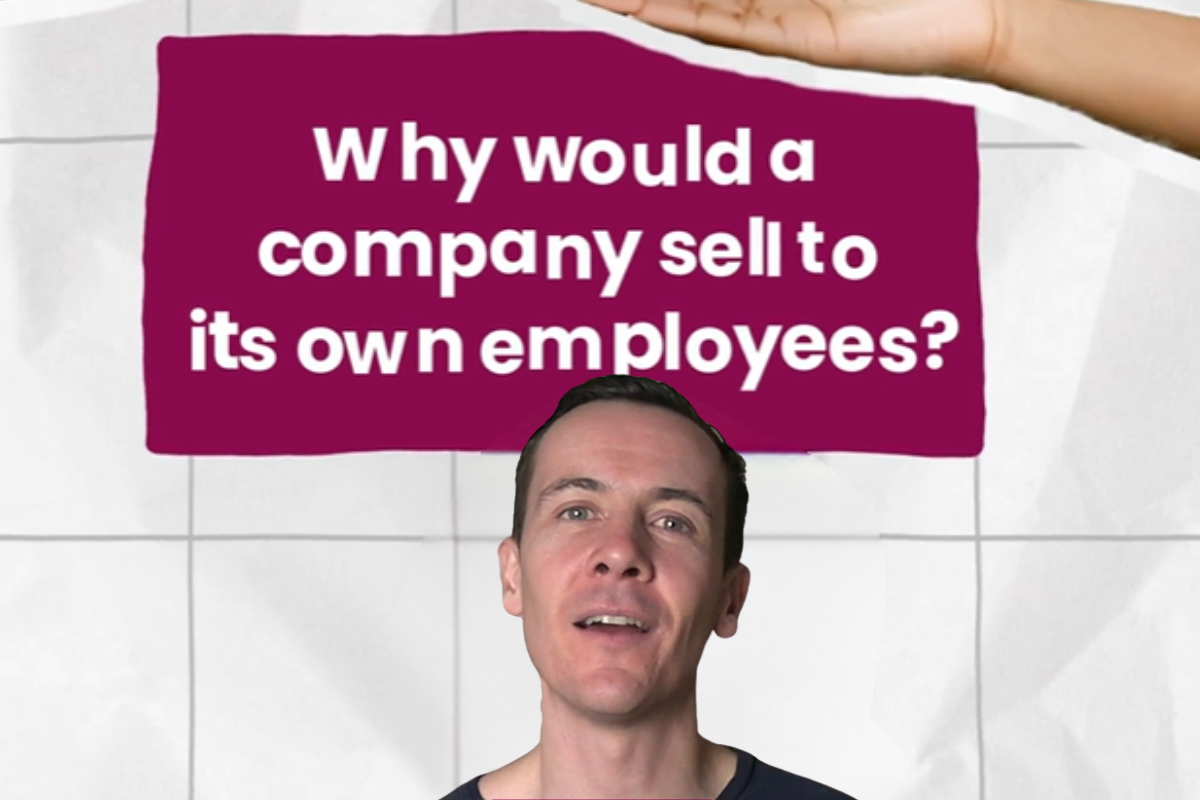By Shane Gibson | This post first appeared in Future of Good.
The Canadian economy is nudging towards a major transition, and a large number of small business owners are approaching retirement. Selling to a bigger business or corporation is one option, but alternative ownership models are giving business owners attractive options to keep their operations local.
Whether converting to a non-profit, forming an Employee Ownership Trust (EOT), or transitioning to a co-operative, alternative ownership not only helps local businesses but can also protect local jobs and keep wealth in the community.
“It’s all about people. It’s all about having control,” explained Dave Walsh, managing director of the Newfoundland & Labrador Federation of Co-operatives (NLFC).
Walsh is talking about co-operatives – an alternative ownership model that allows community members to take control of small businesses and keep them local.
The NLFC is currently part of an initiative working to help small businesses in rural Newfoundland transition to the co-operative method.
The project, called Social Enterprise Through Acquisition, is run with help from the Community Sector Council Newfoundland and Labrador and made possible by a $750,000 investment from the Northpine Foundation.
Walsh said the co-operative model can work well for businesses facing transition.

“Imagine you have a business owner who’s about to retire. They have a couple of traditional options: they can shut down, or they can sell,” Walsh noted, adding typically, that sale might be to a larger company.
He said that, for example, the local hardware store might be bought out by Rona or Home Depot, or a small cafe might sell to Starbucks.
But instead of selling to a corporation, under the co-operative model, the community comes together to take ownership of the business. Walsh said this can be a combination of employees and even customers.
“Basically, they form a small board and run the business through a committee,” he explains. “This way the business stays open and a community doesn’t lose a necessary service.”
While moving to a co-op can be especially effective for organizations with distributed management models, EOTs and non-profit conversions might be a better option for organizations with more traditional management structures.
Changes to Canadian law this year have made employee ownership more enticing for SMEs by exempting the first $10 million in gains from the sale of a business to an EOT.
The EOT model – which sees a trust hold shares of a corporation for the benefit of the corporation’s employees – has given Friesens Corporation in Manitoba the chance to prioritize employees’ values ahead of profit, according to CEO Chad Friesen.
Under the Friesens model, both part-time and full-time employees are beneficiaries of the employee trust, meaning they receive cheques—similar to a dividend payment—several times a year.
“Yes, it feels awesome to hand out cheques,” Friesen said, proudly bestowing the virtues of employee ownership. “But ultimately, you want people to be a part of the whole story, and I have pride telling people how this company started, how we’re owned, and how that benefits the lives of the people who work here.”
Meanwhile, choosing to convert to a non-profit can see the SME itself remain for-profit while a non-profit takes over ownership.
“By being owned by a non-profit, its profits can be redirected into the non-profit to support programming, etc.,” explained Kristi Fairholm Mader with Thrive Impact Fund, a place-based fund in B.C. providing acquisition financing and working capital to social enterprises.
“It is also a good way to diversify revenue, provide inclusive employment, support local economies, and increase sustainable supply chains.
Through the transition to alternative ownership, a business broadens its social purpose, meaning it can serve an important social role in a community—that it makes the community better, according to Walsh.
“Every co-operative started because there was a need, because there was an important gap that someone needed to fill,” he said. “Those are powerful stories – like when you talk about a community that had no daycare, and everyone got together to fill that need.”
Walsh said he thinks those types of stories are about to become more common.
In 2022 a Canadian research project, Co-op Convert, found Canada is set to lose up to 48 per cent of its local businesses in the next five years – mostly due to retirement.
In Atlantic Canada, that number is estimated to be closer to 55 per cent for small- to medium-sized businesses.
Colin Corcoran, CEO of the Community Sector Council Newfoundland and Labrador, said that makes projects like Social Enterprise Through Acquisition even more critical.
“Our goal is to provide a lifeline for communities facing economic uncertainty by safeguarding employment through the conversion of local businesses,” said Corcoran.
Even though Social Enterprise Through Acquisition is a relatively new initiative in Newfoundland (the project was announced in 2023), co-ops are far from a new idea.
In fact, they have a long history in Canada, dating back to the 1860s.
Grocery stores, banks, newspapers, childcare, insurance companies, restaurants, housing and more have all been run as co-ops at one point or another.
According to Employee Ownership Canada (EOC), employee ownership can also boost productivity, job satisfaction, engagement, and motivation among employees. So why don’t we see more alternative ownership models like co-ops in our communities now?
Walsh thinks it’s all about education.
“We don’t learn about co-ops in school anymore,” he said. “You could go through an entire business degree and not talk about co-ops.”
Walsh admits the idea can sound foreign and complicated, and he’s worried some will be deterred from trying it. But he’s hoping his initiative—and others across the country, such as a new employee ownership campaign by EOC—will help educate and change some minds.
“Yes, there is more work than with a traditional business, but it’s worth it,” he said about his experience with co-operative models. “The community is so much more involved. It’s so powerful.”
And he’s not just talking about Newfoundland. Walsh said there’s a big space for co-ops in Canada, and a rich history to back it up.
“Just look at Quebec. They’re leaders in co-ops – in the financial and even the housing sector,” he said. “The Prairies have been leading the way in co-operative business for over a hundred years with grocery stores and credit unions.”
Back in his neck of the woods, Walsh points to the Fogo Island Co-Operative Society as a gold standard in the co-op world.
The co-operative has been going strong on the island, the largest of Newfoundland and Labrador’s offshore islands for more than 50 years.
It was started in 1967 as island residents faced a slowing economy and a dwindling population.
They had a difficult choice: leave their homes and resettle on the mainland or stay and rebuild together.
They chose to rebuild, and since then, the “Fogo Process” – a model for building a co-operative society – has become known worldwide.
Walsh said it’s a testament to what a co-operative future in Canada could look like.
“They were destined for resettlement. Now Fogo Co-op is delivering seafood products all across the globe,” he said. “They’re even one of the biggest fisheries in Canada… and they’re a co-op.”
For more information on co-operatives across Canada, check out Co-op Week 2024 from Oct. 13-19, hosted online by https://canada.coop/en/events/co-op-week-2024/.
Share with a friend
Related reading
Watch the video: Why do Canadians work so hard and get so little?
Low productivity means lower wages and a lower standard of living. Canada does need to boost productivity—but we keep trying the wrong things. Watch SCP CEO Matthew Mendelsohn explain the productivity conversation Canada actually needs to have.
Market study submission: Competition in financing for Canada’s SMEs
Small- and medium-sized businesses (SMEs) face significant barriers to accessing capital and we believe that the lack of competition in the banking sector is one of several important contributing factors. We provided comment on the Competition Bureau's upcoming market study on SME financing because we believe that unlocking capital for SMEs and entrepreneurs will strengthen the Canadian economy, bolster our sovereignty and provide more Canadians with pathways to building wealth. We look forward to seeing how the evidence collected will help inform policymakers interested in tackling this issue.
Watch the video: Why would a company sell to its employees?
Canada is facing a $2-trillion business handoff. What if employees owned more of it? In this video, our Director of Policy Dan Skilleter explains why a company would sell to its own employees, how it happens and who stands to benefits. Spoiler alert: employee-owned companies are shown to be 8-12% more productive, share more wealth with their workers, keep businesses Canadian-owned and shore up the resilience of local communities and the broader economy.


